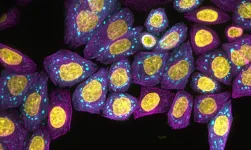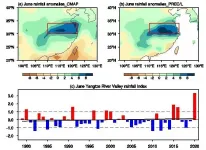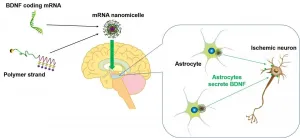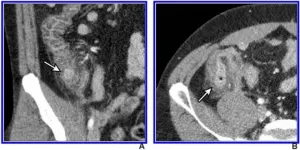(Press-News.org) Powerful algorithms used by Netflix, Amazon and Facebook can 'predict' the biological language of cancer and neurodegenerative diseases like Alzheimer's, scientists have found.
Big data produced during decades of research was fed into a computer language model to see if artificial intelligence can make more advanced discoveries than humans.
Academics based at St John's College, University of Cambridge, found the machine-learning technology could decipher the 'biological language' of cancer, Alzheimer's, and other neurodegenerative diseases.
Their ground-breaking study has been published in the scientific journal PNAS today (April 8 2021) and could be used in the future to 'correct the grammatical mistakes inside cells that cause disease'.
Professor Tuomas Knowles, lead author of the paper and a Fellow at St John's College, said: "Bringing machine-learning technology into research into neurodegenerative diseases and cancer is an absolute game-changer. Ultimately, the aim will be to use artificial intelligence to develop targeted drugs to dramatically ease symptoms or to prevent dementia happening at all."
Every time Netflix recommends a series to watch or Facebook suggests someone to befriend, the platforms are using powerful machine-learning algorithms to make highly educated guesses about what people will do next. Voice assistants like Alexa and Siri can even recognise individual people and instantly 'talk' back to you.
Dr Kadi Liis Saar, first author of the paper and a Research Fellow at St John's College, used similar machine-learning technology to train a large-scale language model to look at what happens when something goes wrong with proteins inside the body to cause disease.
She said: "The human body is home to thousands and thousands of proteins and scientists don't yet know the function of many of them. We asked a neural network based language model to learn the language of proteins.
"We specifically asked the program to learn the language of shapeshifting biomolecular condensates - droplets of proteins found in cells - that scientists really need to understand to crack the language of biological function and malfunction that cause cancer and neurodegenerative diseases like Alzheimer's. We found it could learn, without being explicitly told, what scientists have already discovered about the language of proteins over decades of research."
Proteins are large, complex molecules that play many critical roles in the body. They do most of the work in cells and are required for the structure, function and regulation of the body's tissues and organs - antibodies, for example, are a protein that function to protect the body.
Alzheimer's, Parkinson's and Huntington's diseases are three of the most common neurodegenerative diseases, but scientists believe there are several hundred.
In Alzheimer's disease, which affects 50 million people worldwide, proteins go rogue, form clumps and kill healthy nerve cells. A healthy brain has a quality control system that effectively disposes of these potentially dangerous masses of proteins, known as aggregates.
Scientists now think that some disordered proteins also form liquid-like droplets of proteins called condensates that don't have a membrane and merge freely with each other. Unlike protein aggregates which are irreversible, protein condensates can form and reform and are often compared to blobs of shapeshifting wax in lava lamps.
Professor Knowles said: "Protein condensates have recently attracted a lot of attention in the scientific world because they control key events in the cell such as gene expression - how our DNA is converted into proteins - and protein synthesis - how the cells make proteins.
"Any defects connected with these protein droplets can lead to diseases such as cancer. This is why bringing natural language processing technology into research into the molecular origins of protein malfunction is vital if we want to be able to correct the grammatical mistakes inside cells that cause disease."
Dr Saar said: "We fed the algorithm all of data held on the known proteins so it could learn and predict the language of proteins in the same way these models learn about human language and how WhatsApp knows how to suggest words for you to use.
"Then we were able ask it about the specific grammar that leads only some proteins to form condensates inside cells. It is a very challenging problem and unlocking it will help us learn the rules of the language of disease."
The machine-learning technology is developing at a rapid pace due to the growing availability of data, increased computing power, and technical advances which have created more powerful algorithms.
Further use of machine-learning could transform future cancer and neurodegenerative disease research.
Discoveries could be made beyond what scientists currently already know and speculate about diseases and potentially even beyond what the human brain can understand without the help of machine-learning.
Dr Saar explained: "Machine-learning can be free of the limitations of what researchers think are the targets for scientific exploration and it will mean new connections will be found that we have not even conceived of yet. It is really very exciting indeed."
The network developed has now been made freely available to researchers around the world to enable advances to be worked on by more scientists.
INFORMATION:
The prevalence of SARS-CoV-2 infections in preschool and school children is an important benchmark for deciding whether to open kindergartens and schools. The screening study "Fr1da" led by Anette-Gabriele Ziegler tests children in Bavaria for an early stage of type 1 diabetes. These tests include the collection of blood samples. In response to the COVID-19 pandemic, the researchers had decided to use the valuable study infrastructure of the Fr1da study to detect SARS-CoV-2 infections, too. For this, they developed a SARS-CoV-2 antibody test with particularly high accuracy. During the first ...
The rainfall over the Yangtze River Valley (YRV) in June 2020 broke the record since 1979 (Figure 1). As of June 28, the People's Daily Online reported that there were more than 12 million people affected by flood disasters related to this torrential rain, with deaths or disappearances of 78 persons and a direct economic loss of more than 25 billion CNY. Recently, scientists from South China Sea Institute of Oceanology (SCSIO), Chinese Academy of Sciences revealed the cause of the record-breaking rainfall over the YRV.
According to their study published in Science China Earth Sciences on March 19, 2021, all three oceans of the Pacific, Indian and Atlantic Oceans ...
Researchers from Tokyo Medical and Dental University (TMDU) demonstrate an mRNA delivery system that effectively produces BDNF protein in rat brain to protect neurons from ischemia
Tokyo - A lack of oxygen to brain tissue--known as ischemia--leads to the death of neurons, which results in stroke. Despite considerable research, there are currently no treatments that successfully prevent neuronal death. Now, Tokyo Medical and Dental University (TMDU) researchers have reported a way of delivering mRNA to produce a therapeutic protein that protects neurons. Their findings, demonstrated in rats, ...
Cycling at moderate intensity during dialysis could drastically improve the heart health of patients with kidney failure and result in significant savings for the NHS, according to new research by the University of Leicester supported by the charity Kidney Research UK and National Institute for Health Research (NIHR) Leicester Biomedical Research Centre.
Patients in the CYCLE-HD study were offered 30 minutes of moderate intensity exercise on a specially adapted bicycle during their regular dialysis sessions. Dialysis can lead to long-term scarring of the heart, which can accumulate over time and lead to heart failure. The study set out to examine ...
Ensuring sustainability of crop and timber production would mitigate the greatest drivers of terrestrial wildlife decline, responsible for 40% of the overall extinction risk of amphibians, birds and mammals, according to a paper published today in Nature Ecology & Evolution. These results were generated using a new metric which, for the first time, allows business, governments and civil society to assess their potential contributions to stemming global species loss, and can be used to calculate national, regional, sector-based, or institution-specific targets. The work was led by the IUCN Species Survival Commission's Post-2020 Taskforce, hosted by Newcastle ...
New Curtin University-led research has found climate change will have a substantial impact on global food production and health if no action is taken by consumers, food industries, government, and international bodies.
Published in one of the highest-ranking public health journals, the Annual Review of Public Health, the researchers completed a comprehensive 12-month review of published literature on climate change, healthy diet and actions needed to improve nutrition and health around the world.
Lead researcher John Curtin Distinguished Emeritus Professor Colin Binns, from the Curtin School of Population Health at Curtin University, said climate change has had a detrimental impact on health and food production for the past 50 years and far more needs to be ...
A Curtin University study has found the introduced European honeybee could lead to native bee population decline or extinction when colonies compete for the same nectar and pollen sources in urban gardens and areas of bush.
Published in the 'Biological Journal of the Linnean Society', the research found competition between the native bees and the introduced European honeybee could be particularly intense in residential gardens dominated by non-native flowers, and occurred when the bees shared the same flower preferences.
Under these conditions, it would appear that European honeybees, being very abundant, and effective foragers, with the ...
How can large amounts of data be transferred or processed as quickly as possible? One key to this could be graphene. The ultra-thin material is only one atomic layer thick, and the electrons it contains have very special properties due to quantum effects. It could therefore be very well suited for use in high-performance electronic components. Up to this point, however, there has been a lack of knowledge about how to suitably control certain properties of graphene. A new study by a team of scientists from Bielefeld and Berlin, together with researchers from other research institutes in Germany and Spain, is changing this. The team's findings have been published in the journal Science Advances.
Consisting of carbon atoms, graphene is a material just one atom ...
As SARS-CoV-2 continues to spread in France, a thorough characterization of hospital care needs and of the trajectories of hospital patients, as well as how they have changed over time, is essential to support planning. This led scientists from the Mathematical Modeling of Infectious Diseases Unit at the Institut Pasteur and the University of Cambridge to develop a probabilistic model that can be used to analyze detailed patient trajectories based on 198,846 hospitalizations in France during the first nine months of the pandemic (from March to No-vember 2020). These findings were published in The Lancet Regional Health Europe on March 20, 2021.
This ...
Leesburg, VA, April 8, 2021--According to an open-access article in ARRS' American Journal of Roentgenology (AJR), IV contrast-enhanced 2-millisievert CT (2-mSv CT) is comparable to conventional-dose CT (CDCT) for the diagnosis of right colonic diverticulitis.
"By mitigating concern of missed diagnosis of right colonic diverticulitis, our results further support the use of low-dose CT for suspected appendicitis," wrote first author Hae Young Kim from the department of radiology at Korea's Seoul National University Bundang Hospital. "To our knowledge," Kim et al. maintained, "this is the first study to formally measure the diagnostic performance of CT for right colonic diverticulitis."
Kim and colleagues' large pragmatic randomized controlled trial data included 3,074 patients ...




